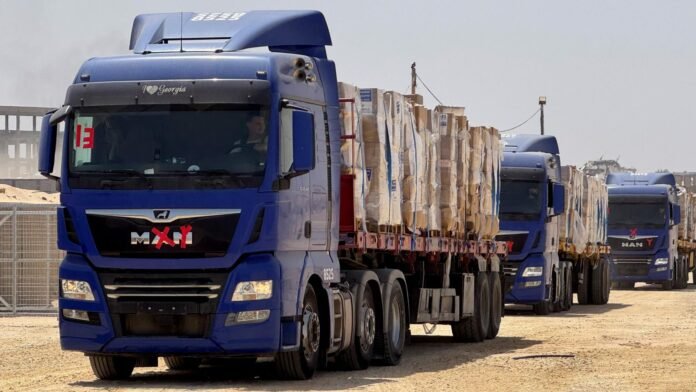The Gaza Humanitarian Foundation began distributing food aid in Gaza this week amid growing international criticism. The US- and Israel-backed organisation announced on Monday that trucks had arrived at its designated Secure Distribution Sites.
According to the foundation, more deliveries are expected throughout the week. The group claims it will provide aid to one million Palestinians by the weekend. However, it did not disclose the exact number of trucks or recipients so far.
The Gaza Humanitarian Foundation is operating outside the United Nations system. Its process uses armed American contractors and Israeli military support at the distribution sites. This setup has alarmed many humanitarian organisations.
Critics argue that the group’s structure undermines the neutrality of humanitarian aid. Several organisations, including the Norwegian Refugee Council, condemned the initiative. They say the plan risks excluding the injured, elderly, and disabled.
UN agencies also oppose the model. They argue that the new distribution approach imposes unsafe conditions and threatens to politicise aid. Some aid workers fear it will worsen displacement and put civilians in harm’s way.
A former USAID official, John Acree, now leads the Gaza Humanitarian Foundation. He took over after Jake Wood resigned, citing violations of humanitarian standards. Wood said the system failed to respect neutrality, independence, and impartiality.
Despite the backlash, the Gaza Humanitarian Foundation insists its model meets international humanitarian standards. It claims opponents benefit from the current system and seek to obstruct progress.
Meanwhile, Hamas has warned civilians not to engage with the new aid programme. The group accuses the foundation of using food to control the population and enforce displacement.
Israel continues its military operation in Gaza, which resumed on 19 May. Prime Minister Benjamin Netanyahu announced plans to expand control across the entire region. The government recently allowed limited food and medical supplies into Gaza under pressure from allies.
Nevertheless, humanitarian agencies report that current aid deliveries remain insufficient. Food insecurity is rapidly worsening. Over 500,000 people now face imminent starvation, according to UN-backed experts.
The Gaza Humanitarian Foundation remains at the centre of a polarised debate over how best to deliver life-saving aid during conflict.
For more politics updates, visit DC Brief.


